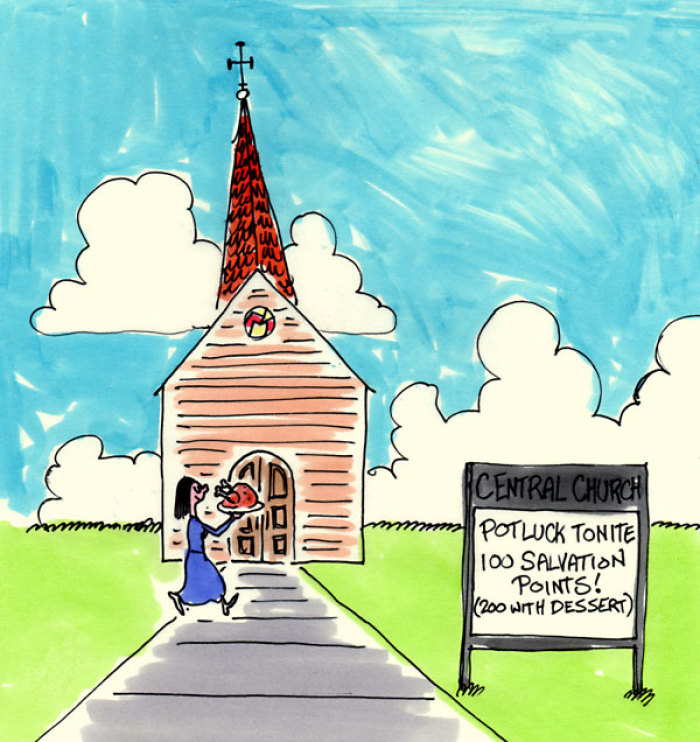Jesus will never tell a Christian: Depart from me

In an oft-quoted passage from the Gospel of Matthew, Jesus reveals the horrifying news some people will receive at the end of time. Unfortunately, these Bible verses get misapplied whenever Law and Gospel are not properly distinguished from one another.
Jesus said, “Not everyone who says to me, ‘Lord, Lord,’ will enter the kingdom of Heaven, but only he who does the will of my Father who is in Heaven. Many will say to me on that day, “Lord, Lord, did we not prophesy in your name, and in your name drive out demons and perform many miracles? Then I will tell them plainly, ‘I never knew you. Depart from me, you evildoers!’” (Matt. 7:21-23).
These lost souls will point to their works as they plead their case to Jesus. “Didn’t we do this? Didn’t we do that?” Self-righteous people rely upon their deeds to get into Heaven. Sadly, they will be locked out for all eternity.
Notice what these people will not say to the King when they stand before Him on Judgment Day. (2 Cor. 5:10). “Didn’t we trust in you for salvation?" "Didn’t we believe the good news of the Gospel?" "Didn’t we rely upon the blood you shed for us on the cross to wash away our sins?”
Some people rely upon their works to get into Heaven, while Christians rely upon Christ’s death on the cross. People who are lost rely upon the Law rather than the Gospel.
“All who rely on observing the Law are under a curse…clearly no one is justified before God by the Law, because, 'The righteous will live by faith'” (Galatians 3:10,11).
Consider these 12 biblical facts:
1. Every Christian is saved, redeemed, born again, forgiven and justified on the front end of their relationship with God.
2. Christians will spend eternity in Heaven, in spite of their imperfections on Earth.
3. Lost people live for sin, and their greatest sin is unbelief. Saved people live for Christ, while nevertheless falling far short of perfection.
4. Some Christians demonstrate signs of spiritual immaturity, such as jealousy and quarreling (see 1 Cor. 3:1-4), but their immaturity does not disqualify them from entering Heaven.
5. Christians who doubt their salvation should be directed to the cross, rather than to their efforts, unless, of course, they are living in deliberate sin. In that case, they should be instructed to repent. “For sin shall not be your master, because you are not under law, but under grace.” (Romans 6:14).
6. No one under grace will hear these words from Jesus: “Depart from me.” No one under grace will be sent to Hell to suffer eternal punishment.
7. People under law do not rely upon Christ’s blood for the forgiveness of their sins. "Without faith it is impossible to please God” (Hebrews 11:6).
8. Those who live in deliberate sin against God need to be presented with the Law. “The Law was put in charge to lead us to Christ” (Galatians 3:24). Jesus said the Holy Spirit “will convict the world of guilt in regard to sin” (John 15:8).
9. Those who are genuinely sorry and willing to turn away from sin are ready to receive and appreciate the Gospel.
10. The physical body of every Christian is "a temple of the Holy Spirit” (1 Cor. 6:19). The Holy Spirit does not dwell inside unbelievers.
11. Satan speaks words of condemnation to believers, whereas the Holy Spirit strengthens the faith of believers and assures them of their eternal home in Heaven. Thankfully, Jesus is “the author of our faith” (Hebrews 12:2), and not the author of our doubts.
12. In Matthew 7:21-23, Jesus describes professing “Christians" who are not justified. On Judgment Day, Jesus will tell these pretenders, “I never knew you. Depart from me."
Jesus declared in Matthew 7 that only those who do the will of His Father will enter the kingdom of Heaven. Does this mean that some followers of Christ are perfect in thought, word and deed? Of course not.
The process of a Christian becoming more like Christ is called sanctification, whereas justification takes place at the moment of conversion. Justification is not a process. It is a fixed reality in the life of a believer, similar to the foundation of a house.
It is a huge theological error to assume that a spiritually immature Christian is not born again and justified.
God knows every heart. God knows who is saved, and who remains lost in their sin. The Law is designed to warn unbelievers, as well as professing “Christians" who are pursuing sin. The comfort of the Gospel, on the other hand, is reserved for contrite believers, and for unbelievers who are willing to turn from sin.
Matthew 7 should never be used as a sledgehammer to frighten spiritually immature believers, or in some misguided attempt to “squeeze a little more juice out of the orange.”
Christians bear fruit when they are faithfully and consistently fed God’s Word. When believers are motivated by the Gospel and Scripture, they respond to God’s grace in faith and obedience. Christians do not grow up into spiritual maturity when their salvation is called into question simply because they are far from perfect. We will not be perfect until we get to Heaven.
Scripture instructs believers: “Aim for perfection” (2 Cor. 13:11). How? By trusting in the Perfect One who died in our place on the cross, and seeking to please the Lord in everything we do.
Justification occurs when the "righteousness from God” covers your sins the moment you are forgiven through faith in Christ alone. (Romans 3:22). Sanctification involves seeking to live a righteous life as a believer, not in order to be justified, but because you have already been justified.
So be encouraged my friend if you are a Christian. Follow the leading of the Holy Spirit as you meditate upon Scripture every day. And stand on God’s promises even in the midst of your current imperfections, as you look forward to the day when the King of Kings will welcome you into the glorious and magnificent splendor of Heaven. (Matthew 25:21,23).
Dan Delzell is the pastor of Redeemer Lutheran Church in Papillion, Nebraska.




























